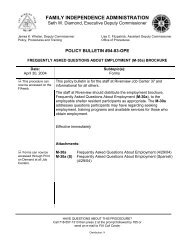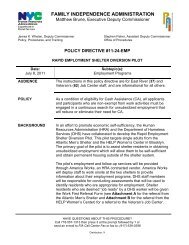family independence administration - Online Resource Center
family independence administration - Online Resource Center
family independence administration - Online Resource Center
Create successful ePaper yourself
Turn your PDF publications into a flip-book with our unique Google optimized e-Paper software.
Attachment C<br />
Helpful Tips for Working with an Interpreter<br />
1. Brief the Interpreter-<br />
a. Identify the name of your program and unit.<br />
b. Provide specific instructions of what needs to be done or obtained.<br />
c. Inform the interpreter if you will need assistance placing a call to an<br />
applicant/participant. If you need assistance placing a call to an<br />
applicant/participant, you may ask for a dial-out. There is a limited<br />
amount of time allotted for placing a dial-out once the interpreter is<br />
on the phone. Therefore, it is important that you provide a brief<br />
introduction and specific instructions to the interpreter in a timely<br />
manner.<br />
2. Speak Directly to the Applicant/Participant-<br />
a. Communicate directly with the applicant/participant as if the<br />
interpreter is not present.<br />
b. The interpreter will relay the information and then communicate the<br />
applicant’s/participant’s response directly back to you.<br />
3. Speak Naturally, Not Loudly-<br />
a. Speak at a normal pace (not too fast or too slow).<br />
b. Speak in one or two sentences at a time. Try to avoid breaking up a<br />
thought. The interpreter is trying to understand the meaning of what<br />
you’re saying, so express the entire thought at once if possible.<br />
c. Pause after expressing a thought to ensure that the interpreter has<br />
enough time to deliver your message.<br />
d. If something is unclear, or if the interpreter is given a long<br />
statement, he/she will ask you for a complete or partial repetition of<br />
what was said, or to clarify what the statement meant.<br />
4. Ask if the Applicant/Participant Understands-<br />
a. Don’t assume that a LESA applicant/participant understands you. In<br />
some cultures a person may say “yes” as you explain something,<br />
not meaning that they understand you but rather that they want you<br />
to keep talking because they are trying to follow the conversation.<br />
b. Keep in mind that a lack of English speaking ability does not<br />
indicate a lack of education.<br />
5. Do Not Ask For the Interpreter’s Opinion-<br />
a. The interpreter’s job is to convey the meaning of the source<br />
language and under no circumstances may he/she allow personal<br />
opinion to color the interpretation.<br />
b. Do not hold the interpreter responsible for what the<br />
applicant/participant does or does not say.
















